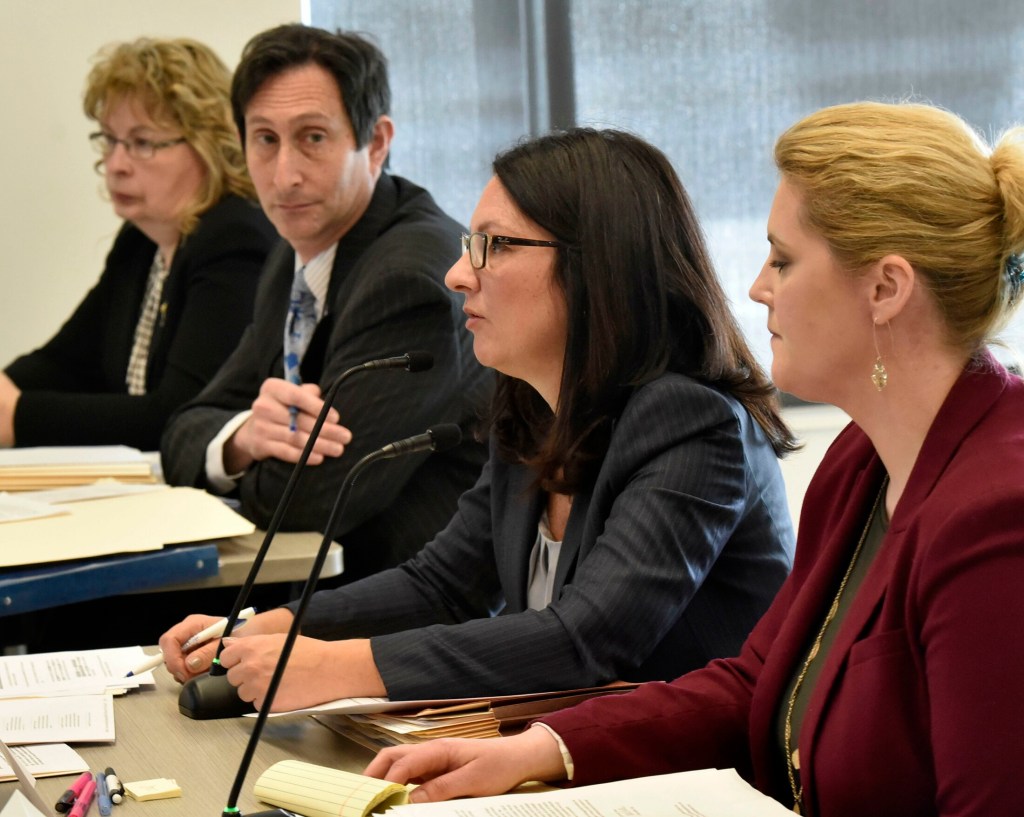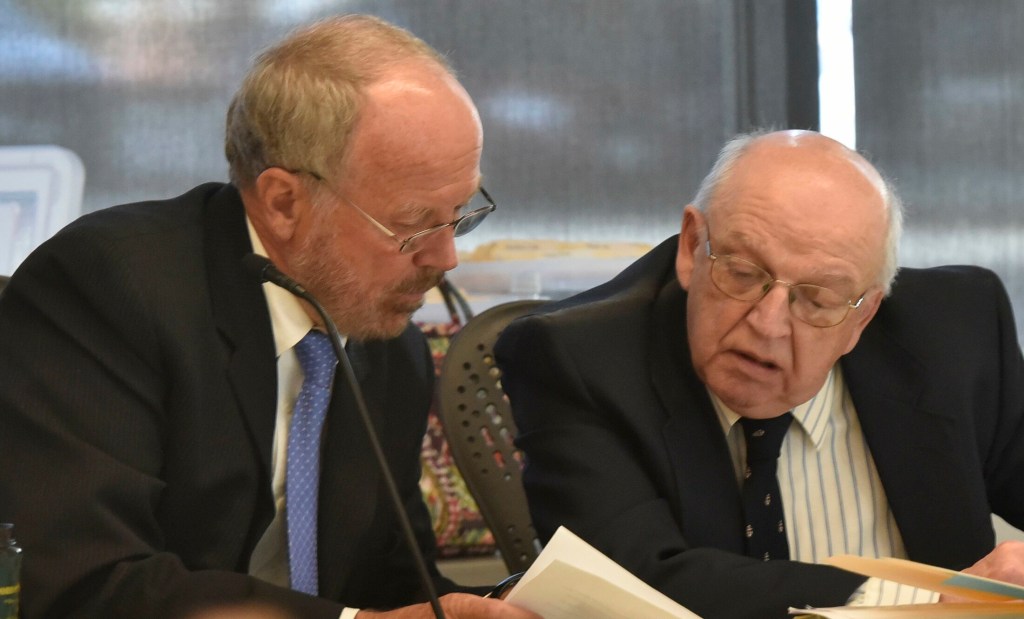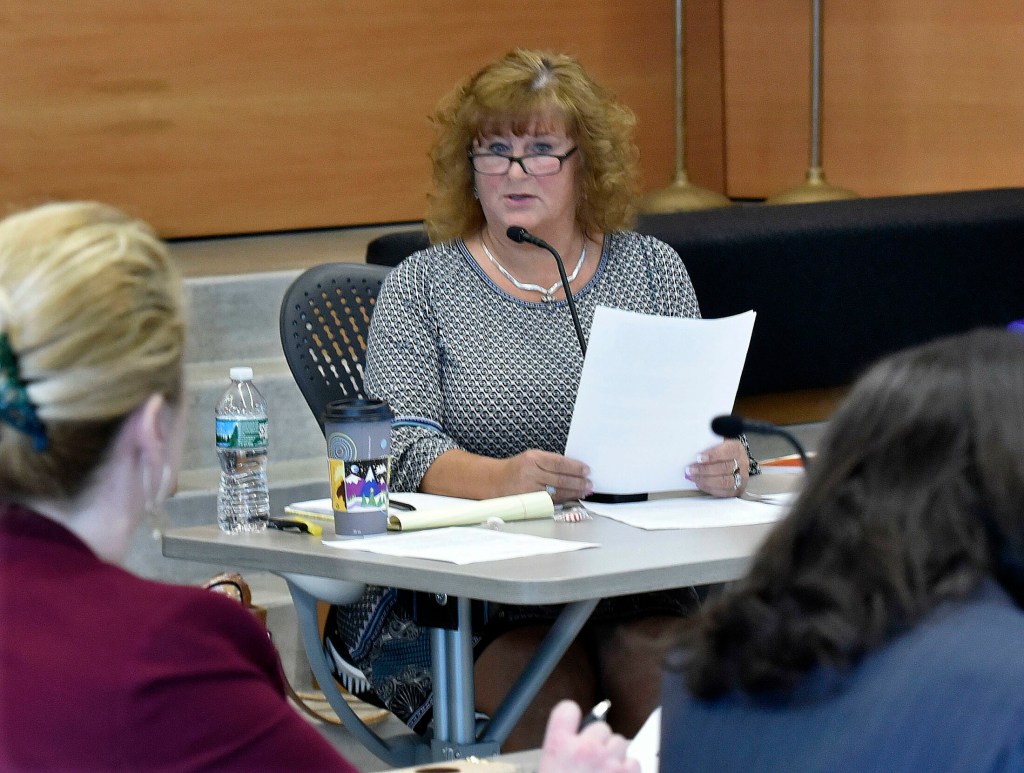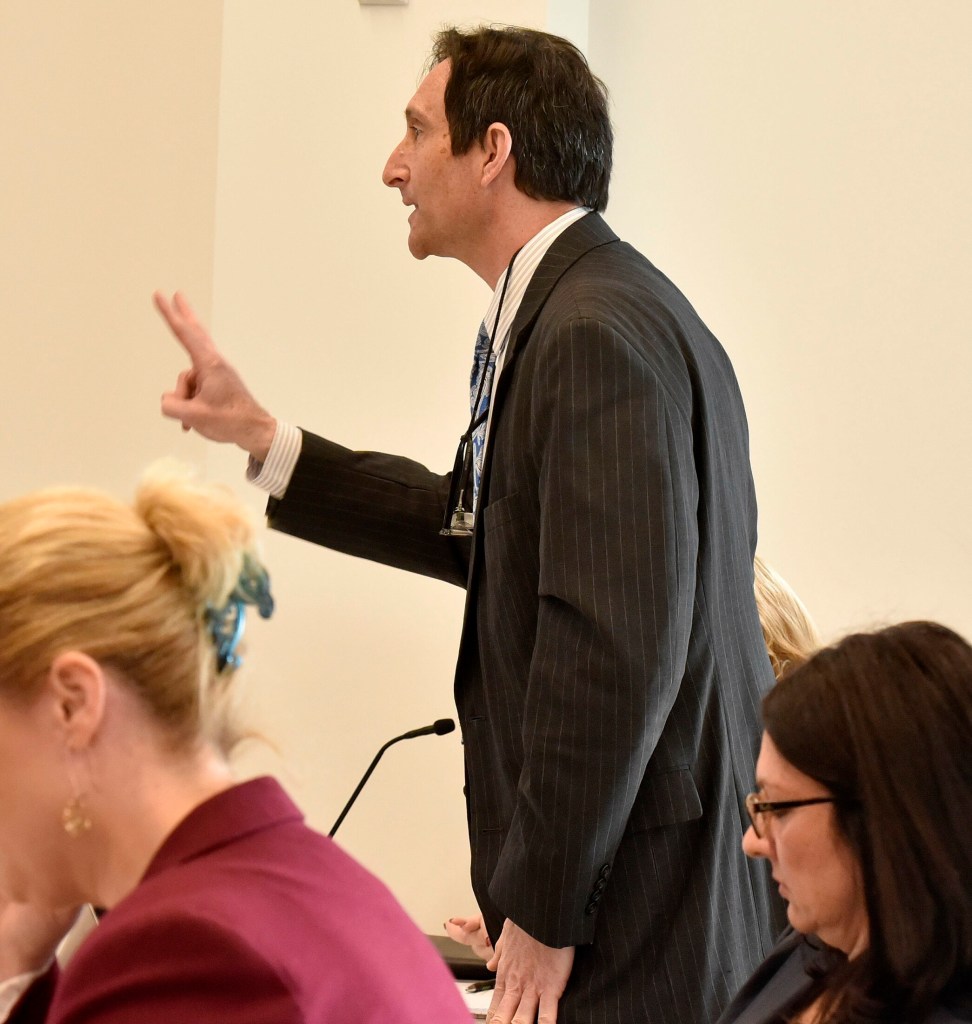WATERVILLE — Waterville attorney David Geller grilled Colby College senior Anna Braverman, who registered to vote in Waterville in February 2016.
He wanted to know if she has a motor vehicle on campus, under whose name it is registered, where it was registered and under whose policy it is insured.
But Leah Rachin, an attorney from Bergen & Parkinson, of Kennebunk, working on behalf of Braverman and 74 other Colby students and faculty, objected.
“I think this line of questioning is inappropriate and entirely irrelevant,” she said.
Furthermore, questions about Braverman’s driver’s license and where her car is registered are enforcement issues and have nothing to do with what she intended at the time she registered to vote, Rachin said.
“This isn’t the board’s bailiwick to make those determinations,” she said.
Roland Hallee, chairman of the Waterville Voter Registration Appeals Board, agreed with her objection.

Colby College students, from left, Anna Braverman, Lutie Brown and Colleen George are sworn in before testifying before the Waterville Voter Registration Appeals board during a hearing in Waterville regarding voter eligibility on Wednesday. Morning Sentinel photo by David Leaming
The board on Wednesday was holding its first session of unusual public hearings to hear appeals from Waterville resident Cathy Weeks, who is one of three people disputing the eligibility of 75 Colby students and faculty to vote in Waterville. Those voters cast ballots in the Nov. 6, 2018, election that resulted in the approval of a plastic bag referendum that prohibits businesses 10,000 square feet or larger from dispensing the bags. Geller said he was representing only Weeks and not her husband, Jonathan, or challenger Shaun Caron, the two other opponents who were present Wednesday morning but did not speak during at least the first block of hearings.
Representing the board was City Solicitor William A. Lee III, who explained that the board was to decide the cases based on evidence provided at the hearings, which are being held in the Chace Community Forum at Bill & Joan Alfond Maine Street Commons downtown. They were to continue all day Wednesday and until noon Friday. The board plans to issue decisions either Friday or on Wednesday, May 8. Besides Hallee, board members are Kim Lane and Roger Collins.
Answering Rachin’s questions at the start of the hearings, Braverman said she lives in a dormitory on the Colby campus and her address is a number and Mayflower Hill. She lives in the city 10 months out of the year but did so an entire year one year, as she lived here in the summer also, she said. Her parents live in New York, but she considers Waterville home, she said.
Braverman volunteered at the Mid-Maine Homeless Shelter eight months during her freshman year, volunteered all four years for Colby Cares About Kids and works with a “wonderful 10-year-old” at Albert S. Hall School with whom she is very close and has built a strong relationship, she said. She works at Colby’s Miller Library and, in the summer of 2017, worked at the Colby College Museum of Art.
She attended summer camp in Maine two years in her youth, which led to her decision to attend college in Waterville, she said.
“Maine has long been home for me,” she said.
After the Nov. 6 election, Braverman was notified her vote was being challenged and her eligibility to vote was being questioned. On Nov. 30, she submitted another application for residency. Geller asked her if she considered herself a Waterville resident continuously from the first time she registered to vote and on Nov. 30. She answered in the affirmative.
He asked if she understood that, under Maine law, if she continued to drive here, she is required to get a Maine driver’s license. She said she was not aware at the time she voted. Geller then asked a series of questions about whether she has a credit card, where her bank is located, whether she has a municipal library card and whether she has a bedroom at her parents’ home in New York.
And so it went with other students, as well as with Colby psychology professor Melissa Glenn.
THE LAWYERS DEBATE
But before the questions started, Amy Olfene, an attorney from Drummond Woodsum, of Portland, who said she was there on behalf of Colby College, argued that the hearings should not be held because the Maine Supreme Judicial Court already determined the issue had been resolved, thus precluding the board from hearing the cases. Olfene said she filed a letter April 19 stating that position. The board, not yet having reviewed the motion, voted 3-0 to take it under advisement and make a decision later, after they have reviewed the information.

Attorneys address the Waterville Voter Registration Appeals board during a hearing in Waterville regarding voter eligibility on Wednesday. From left at the table are City Solicitor Bill Lee, board chairman Roland Hallee, and members Kim Lane and Roger Collins. Morning Sentinel photo by David Leaming
But Geller objected to her claim, saying Colby is not a party to any of the cases and is a “non-standing party.”
“You can’t just submit a motion because you want to see a certain outcome. You actually have to have standing,” he said.
Olfene said she wanted to make clear that Colby’s sole interest had nothing to do with the ballot initiative and everything to do with the rights of Colby students and staff to vote in a municipal election.
Geller said he agreed with Olfene that the ballot challenge issue was resolved, but what was not resolved by the court was the voter challenge issue. He argued that the Weekses and Caron were never notified of their right to appeal, but Rachin disputed his claim, citing “formal notice versus actual notice.”
“Clearly, the challengers all knew what the result was because here we are,” she said.
Oakland resident Mark Andre, who helped launch the voter challenges, occasionally stepped up to Geller, Cathy Weeks or Caron during the hearings to address them privately. Andre, who has run unsuccessfully as a Republican for a local legislative seat and is a frequent attendee of Waterville City Council meetings, is prohibited from taking part in the hearings because he is not a city resident.
Geller said voting is a fundamental constitutional right for every adult citizen in the U.S., but that right must be extended legally and properly. The residency requirement becomes much more complicated when one considers all the cases before the board. Each case must be decided on a case-by-case basis, he said, and where each of the college students resides for voting purposes is key.
Rachin opened her case by saying “it feels like this is déjà vu all over again,” because students and faculty have to repeatedly defend the validity of their votes and that the right to vote “is something that needs to be defended vigorously.” The law, she said, spells out a student’s right to vote.
“We’ve heard that this (appeal) is all about maintaining the sanctity of the process, and we would ask that you not be fooled by that,” she told the board. “This is an attempt to disenfranchise Colby voters.”
She added that there are those who believe “people from away” or those who have different leanings politically should not be able to decide issues, “which would appear happened in this case.” The intent is to place an extremely onerous burden on those voters, according to Rachin.
The law, she said, requires that the residence of a person is that place where the person has established a fixed and principal home and where, whenever they are temporarily absent, they intend to return. The undisputed fact is that the voters being challenged live in a dorm or apartment in Waterville, she said.
“No one lives in any place other than Waterville. That is clear.”
There is a laundry list of factors that may be considered when determining residency, but they are not mandated to be considered, according to Rachin.
Geller said if a person claims to be a resident of Waterville but continues to drive a motor vehicle with an out-of state driver’s license and fails to get a Maine license, he or she has not established Waterville as a residence.
“You’ll see that many of the challenged votes will fit into that particular scenario,” he said.
City Clerk Patti Dubois, who also is the city’s registrar of voters, determined previously that the voters were eligible to vote in the city. She said that when students first arrive in the city, they typically do not have any documentation other than their number on Mayflower Hill, and when that is the case, an oath suffices. That also is the case when people move to Waterville and may not immediately have registered vehicles or obtained drivers’ licenses, she said.
Rachin asked if Dubois asks for all the documentation that a person who has lived in the city a longer time would have, such as mail, driver’s license and so forth; Dubois said she does not. She asks for proof of identity and proof of residency, if available, and an oath, as required by the Secretary of State’s Office.
PROFESSOR, STUDENTS TESTIFY
Glenn, the Colby psychology professor, testified that she is in her 12th year teaching, has lived two years in a building on campus and owns a house on Roosevelt Avenue. She gets her mail at her office building for professional purposes and her personal mail in a room on campus. Her mailing address, she said, is Mayflower Hill, and she cited a number that corresponds to her mail slot in a room there. Rachin asked Glenn, who has a husband and daughter, why she registered to vote in Maine.
“I live here, and as a resident of Maine, I like to exercise my right to vote,” she said.
Asked what her reaction was when she learned her right to vote was being challenged, Glenn said she was surprised.
“I was shocked, I guess, to be confronted by such a challenge to my residency when it was so obvious that I do, in fact, live here,” she said. “I was also outraged on behalf of the students as well.”
Geller said her comment was “irrelevant” and asked it be stricken from the record.
On cross-examination, Geller asked Glenn how her motor vehicle registration lists her mailing address. She said it is her Mayflower Hill address and she cited the number. He asked if that number was a mailbox and if it was used when designating her residence.
“I don’t live in a box, that’s correct,” she said.

Attorney Leah Rachin shows documents to Colby College professor Melissa Glenn, at right, during her testimony Wednesday at a hearing before the Waterville Voter Registration Appeals board regarding voter eligibility. Morning Sentinel photo by David Leaming
Geller said that’s what triggered the challenge to her residency. He conceded that the challenge to Glenn’s residency had been cleared up as a result of the hearing, but when Hallee asked if the appeal was dismissed, Geller said it was not. Glenn was no longer being challenged, he said, but he was not withdrawing the appeal and he wanted the paperwork she submitted to be part of the record.
Colby students Colleen George and Lutie Brown were next up. They were asked similar questions, though both testified they do not have a motor vehicle or driver’s license, nor do they know how to drive. Brown said she writes for the Colby student newspaper and is involved in community activities. She is from New York but considers Waterville home and wants to stay here, she said.
“I love it here. I love the city. It is very different than New York. I love it more.”
Geller said a person can claim to be a resident, but if everything else indicates otherwise, actions speak louder than words. The court can consider other evidence, and the board can consider other evidence that contradicts an oath, he said.
He continued to ask Brown questions, including if she planned to stay in Waterville. Brown said she hopes to stay. Rachin objected to Geller’s question, saying it was about the future and “we’re talking about Nov. 6, 2018.”
Asked after their hearings what they thought of the process, George used an expletive to express frustration with the hearings.
“I think this is a big waste of time,” she said. “That said, I’m willing to go through this ridiculous process in order to ensure that things don’t repeat themselves — that we don’t have to go through this again.”
Brown said it was inappropriate to be asked questions about where students work, what they will do in the summer and other things.
“I got angry during my testimony because I found the whole process to be offensive to student voters,” she said. “And the line of questioning was really ridiculous, because we’re here to affirm our residency in the city of Waterville.”
Asked during a break in the hearings how much the city is paying or will eventually be charged in legal fees, Lee said that he was not certain. But based on the fact that the total was already $10,000 back in March, he would not be surprised if it would total $25,000, he said.
Send questions/comments to the editors.






